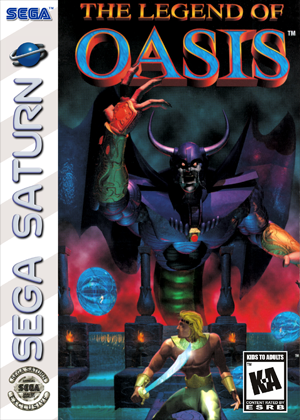One of the best action RPGs that isn't named Zelda
The Saturn wasn’t the most popular game console during the mid-to-late ’90s, overshadowed by the PlayStation and N64, but there were a number of great games made for it that I wanted to sink my teeth into. Imagine my surprise when during the first few minutes that I demoed the game I wasn’t all that impressed. The graphics looked fairly 16-bit (though clearly on the higher spectrum of 16-bit), the control was responsive but seemed simple, and the admittedly stale introduction did nothing for me.
However, as is always the case with traditional games, it’s the time spent with the solid game play mechanics, puzzles, and world that will draw you in – 5 minutes simply does not do it justice. Knowing this, I returned to it when I had several hours to freely immerse myself. What I found was exactly what had drawn me to it years ago in the pages of magazines; a well crafted action RPG in the tradition of Zelda, playing much like the 32-bit version of Secret of Mana that I’d imagined (there’s even a code that unlocks a blazing 2 player mode!).
The Elemental Armband
The main character Leon is to become the new Spirit King, and using his Golden Armband he must gather the 6 Elemental Spirits (Earth, Water, Fire, Air, Sound, and Shade) who will aid him in his quest to vanquish Agito, the evil spirit. While not exactly the most original plot (it’s virtually identical to the first game), the storyline is connected with the core game play in every way. And that game play is pure gold. Once collected, the spirits can be summoned by blasting anything in the environment that corresponds to its element (literally – from torches, to water droplets, and even enemies) using the Golden Armband. They can only be summoned one at a time, following you around until dismissed.
Each Spirit has 3 different actions, which can be used to either damage enemies or affect surrounding objects in the environment. You can kill enemies, extinguish fires, or freeze water fountains for use as stepping stones, all with the same Elemental Spirit attack. While there are the typical switches to be switched, blocks to be pushed, and keys to be collected, completing dungeons requires you to use the Elemental Spirits in new and inventive ways in different combination in almost every room. Add to this four different weapon types (which can also be powered up with Elemental energy), and the 12 or so physical moves Leon can perform using various button combinations, and you have an ambitious control scheme on your hands. With the Saturn pad’s 6 face buttons and 2 triggers in use, it takes some getting used to, but works perfectly.
Graphics
The graphics are hand-drawn but tile-based. While its contemporaries like Legend of Mana are stunning to look at, the floaty feeling of walking around on scanned artwork, and the inevitable breaks in perspective each new screen, detract from the game play and feeling of the classic action RPG. With a tile-based system, the angle is consistent as are the character sprites in relation to their world. And those sprites are well animated, with particular attention paid to Leon and the Elemental Spirits.
Graphically the game ranges in quality, with some prerendered 3D models looking a bit out of place in the otherwise hand-drawn world. There are only a couple of special effects (mostly some scaling), and they’re not that impressive. Knowing this, the designers seek to impress with all their time and effort creating the whimsical animation in the characters and elementals, and crafting difficult puzzle dungeons, which isn’t a bad trade off.
Kickin’ it Oldskool
To their credit they were largely successful, as I found myself completely absorbed, challenged and had loads of fun! Speaking of challenge, this game can be very difficult indeed; clues are cryptic and the world is gigantic – growing in size as you unlock new areas using new found abilities. The developers went so far as to put secret areas in the earlier dungeons that can only be unlocked if you return with the proper Elemental Spirits found much later in the game.
Unfortunately, the music composition is far too ambient – sometimes almost nonexistent, and what is there is repetitive and often muffled out by the much louder sound effects, which are pretty standard fare. If this game had had a stirring musical score to accompany its epic quest, it easily would have ranked up there with the very best chapters in the Zelda series, but sadly falls a bit short. What makes this doubly frustrating is that Ancient (the developer) was co-founded by Yuzo Koshiro, a well-respected composer!
(this review is a repost from my website, www.plasticpals.com)
